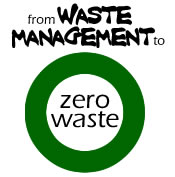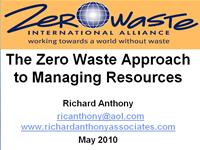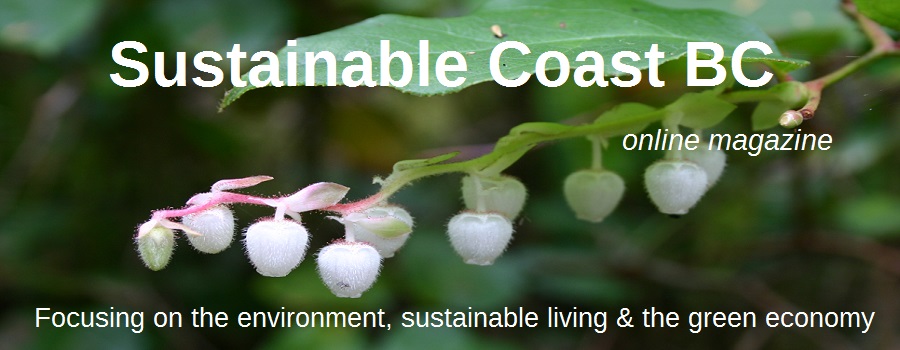News
May 29 - Gibsons workshop. SuCESS and a number of local businesses sponsored a two-day workshop on Zero Waste on the Sunshine Coast on May 29 and 30. A number of well-known environmental advocates spoke at the workshops and brought valuable information to the community.
 The headline speaker on both days was Richard Anthony of Richard Anthony Associates. Anthony is an internationally recognized Zero Waste consultant and a founder of ZWIA, Zero Waste International Alliance. At the Gibsons workshop Anthony discussed the principles of Zero Waste.
The headline speaker on both days was Richard Anthony of Richard Anthony Associates. Anthony is an internationally recognized Zero Waste consultant and a founder of ZWIA, Zero Waste International Alliance. At the Gibsons workshop Anthony discussed the principles of Zero Waste.
Other speakers for the day included Tim Turner of the Sea-to-Sky Environmental School, Clint Mahlman senior vice-president of London Drugs and Rod Muir of Sierra Club Canada.
Around 50 people attended each of the workshops which also included displays from local businesses that dealt in recycled products or the environment.
Tim Turner of Sea-to-Sky led the speakers of the day. Turner, a former high school teacher in Vancouver, heads the outdoor education program. He uses the outdoor classroom for sustainability education. The school works with all school districts in the region and he reported that 2000 kids attend each year.
He sees that we are stuck on recycling which is the 1970's model. "When I see us talking about Zero Waste, " he said, "We are being bold. We need boldness. The same old, same old has left us consuming 40% of nature each year."
Turner said that the school uses their 3 R's : Real, Relevant and Revolution.
- Real - not Hollywood.
- Relevant - the curriculum needs to be bold as we are in a planetary crisis.
- Revolutionary - as a community we must get our act together and go to Zero Waste, not keep our take, make, waste society that all goes to a landfill.
The school is seasonal, opening in September to mid-November. Turner says they create a culture that nurtures a community of learners that can imagine being in another world. Outdoor school is all about living a one planet lifestyle.
Turner showed the audience the Outdoor School "Go Gear". This is a backpack that the students always carry with them. It contains a cloth napkin, lunch container, shopping bags, water bottle, cutlery, pen and paper, a hat and a jacket. Carrying this gear and not creating waste is considered a life skill.
The program is organized to lead the kids to three transitions: 1) me to we, 2) inside to outside and 3) back to local. Once they make the transition, they are given strategies to go slow and pay attention which in turn leads to them getting involved.
Clint Mahlman of London Drugs,who has a coast family background, gave an overview of the family-owned company. London Drugs has been in business over 100 years as a retailer. They are very committed to community and work to understand their customers. He says they understand that being sustainable is just good business. London Drugs was one of the first retailers to recycle bags. Research has found that 75% of their customers are concerned about green washing.
Mahlman said that London Drugs uses the Four Pillar Strategy:
- Upstream Buying side by reducing packaging and encourage buying with a list of sustainable products
- Recycling and Reuse programs that minimize solid waste and includes data security on electronic waste
- Minimize energy and operating costs through energy management
- Educate employees and consumers
Mahlman listed a number of impressive statistics including that the Gibsons store has reduced its waste by 70%. In 2007 they had one bin pickup a week and now they have one bin pickup every 4-6 weeks.
In 2008 London Drugs diverted 10.4 million pounds of waste from landfills and in 2009 it was 10.6 million.
He also emphasized the London Drugs "Green Deal" which gives the customers information regarding the sustainability of products and lets them decide. The program also includes the company's policy of taking back packaging materials and recycling products bought at the store. (See the Sustainable Coast story "Coast London Drugs particpates in recycle program", a story on the Green Deal in a previous issue).
The government can play an important role by consulting with businesses to help them avoid the pitfalls and businesses should support the government's efforts in waste diversion.
He told the audience that, "it's a journey and we are in constant evolution."
Rod Muir of the Sierra Club describes himself as a realistic environmentalist. He said there are three important things to do: be upfront with people, be motivating and be more medieval. He says we must be more upfront about where our stuff goes and what are the true costs of waste. We must also educate and motivate people to understand and participate in Zero Waste.
Finally, by being more medieval he means we must reuse and not throw away good resources. Use everything as was done in older times. Holding up his trademark can-cell phone-banana he emphasized the need to look at our waste as a resource and reuse components of items instead of just tossing them into landfills.
For more on Ron Muir's message see: Recycling Council of BC conference report by Sustainable Coast.
Consultant Richard Anthony of Richard Anthony Associates devoted the afternoon session to the principles of Zero Waste. Anthony is a board member of ZWIA, Zero Waste International Alliance of which the SCRD is a member.
Anthony discussed how our society used to not throw things away but over the last 40 years we have become a throw-away society. He stated that we need to impart three simple messages regarding Zero Waste: that it brings efficiency, it brings jobs and it ends the welfare for wasting.
 He told the story of early activism for Zero Waste when Coca Cola went from aluminum cans to plastic bottles. In order to get Coca Cola to take back their plastic bottles, a campaign was started to mail the bottles back to the company. It was a three year campaign in which a number of organizations participated called "Coke broke it's promise". Another nine month campaign convinced Dell computers to take back their old computers. He says in these campaigns, first they ignore you, then they laugh, then they mediate and then you win.
He told the story of early activism for Zero Waste when Coca Cola went from aluminum cans to plastic bottles. In order to get Coca Cola to take back their plastic bottles, a campaign was started to mail the bottles back to the company. It was a three year campaign in which a number of organizations participated called "Coke broke it's promise". Another nine month campaign convinced Dell computers to take back their old computers. He says in these campaigns, first they ignore you, then they laugh, then they mediate and then you win.
He feels that companies want to do it right. Many companies are up to 90% conversion. It is good business, it saves dollars. Businesses are leading the way. Zero Waste companies are making other companies join in. Anthony says that not only is managing your resources good business, it is also good science.
He emphasized two principles of Zero Waste: no bury and no burn. "If they want to burn it, it is not Zero Waste," he said. He says landfills are the largest source of greenhouse gases. Methane is 21-71 times more potent than CO².
"By recycling and composting in your community - you eliminate the equivalent of all car emissions in your community."
The solid waste management approach is the worst way to deal with our waste. Using the Zero Waste model you source separate your materials and then give them to the highest and best use. With this model you create jobs and market those resources to make money from the discard sales. These market categories have been developed by Dan Knapp of Urban Ore into a "Clean Dozen Master Categories". Using these categories, nothing is left out or left over.
This resource recovery company is located in Berkeley, California on three acres of property. They are a well-organized facility with a general store, building materials exchange, arts and media exchange and hardware exchange. They also do conceptual designs of Zero Waste facilities. (http://urbanore.ypguides.net/)
Anthony stressed that a Zero Waste economy is a full circle system. It involves education and training. You need to train staff, educate everyone, and have enforcement and reinforcement. People need to learn to control what they buy and when you do that, you control your waste.
He gave the audience a list of the 5 R's:
- Refuse - to buy wasteful stuff
- Return - packaging to supplier
- Reduce - waste at source
- Reuse - everything
- Recycle - remaining waste streams
He also emphasized that not only do you educate people, but it is important to set up markets for the recovered materials. The separation of materials is market driven. You must find your markets and their load limits. He also said there is a market for just about everything.
Consultation with the reuse industries is important. Here you can ask what do you want and what can you use? Then you can collect it. Also consult with your farmers and nurseries as they will use the organics composted. And finally, training is needed to deal with the discards. Anthony would like to see the university system begin to education people in this special area.
A RRP provides a service opportunity at an existing landfill. Employees can cooperate and almost everything can be diverted to resource recovery. For those people who do not want to separate, they can be charged more to "dump and run". The RRP can be organized in a cluster analysis of recycling, organics, reused products and special discards. It is important that you make the RRP service convenient and available.
Processing Centres are located there where items are brought in and different vendors and businesses buy it for reuse. The rest of the items are then dismantled for usable parts and materials. Composting facilities take in the organics and produce a product for sale.
Part 2 will cover the Pender Harbour workshop on RRP design.
